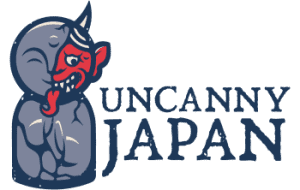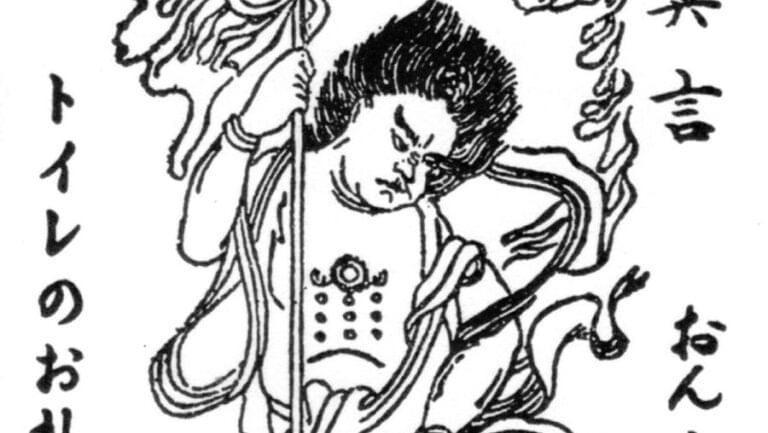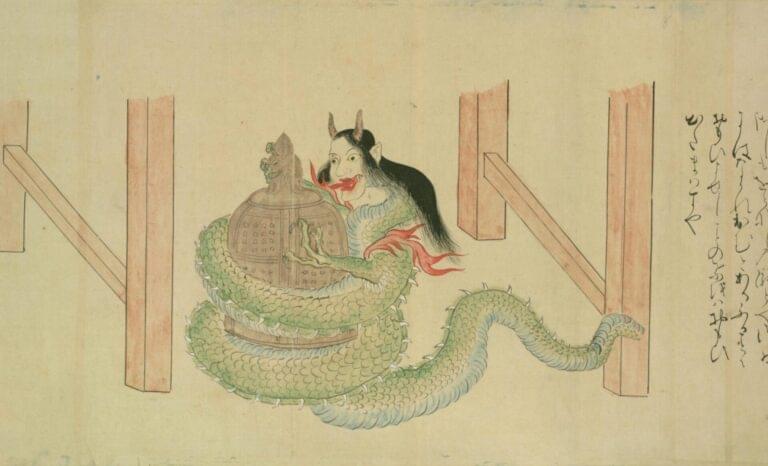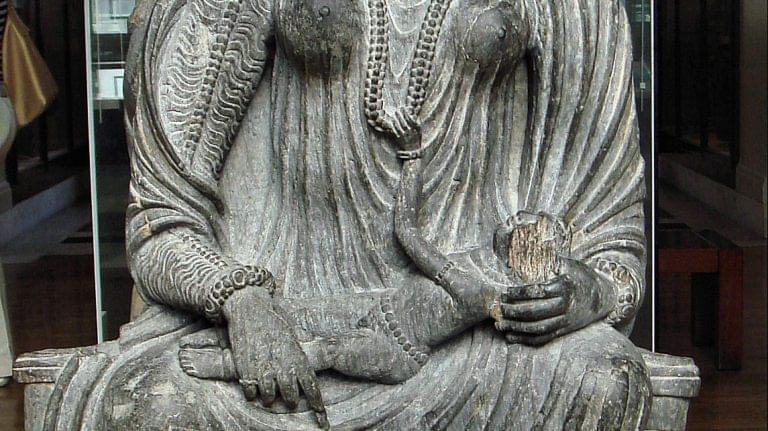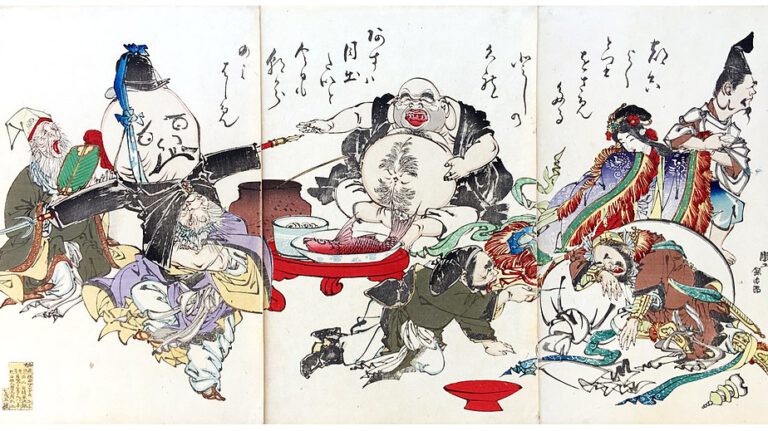So you’ve died in Japan. Let me help you navigate the underworld and if we can avoid the nastiest hells.
Hey hey. This is Thersa Matsuura, author of the Book of Japanese Folklore, and coming this fall in 2025, the Yōkai Oracle Deck, which you can pre-order if you’d like. And I’m here to share with you all those hidden, fascinating, and sometimes frightening corners of old Japan. Come with me as I explore strange superstitions, creepy creatures and cultural curiosities right here on Uncanny Japan.
Hey, hey everyone. I’ve got some massive news to share with you. Maybe you figured it out at the very top of the show today. But for nine years, I’ve been researching, writing, and recording Uncanny Japan with Richard by my side, and we’ve been doing it independently.
But today I’m excited to announce that Uncanny Japan is now part of the SpectreVision Radio network. Founded by Elijah Wood, Daniel Noah, and Josh Waller, SpectreVision Radio is a collection of some really amazing podcasts that focus on horror, the weird, the wonderful, and the strange.
What does this mean for you? Well, basically nothing changes on your end. You’ll still get the same Uncanny Japan episodes delivered to your favorite podcast app every two weeks, just like always. All kitsune Tier patrons and above will continue to receive episodes ad-free over on Patreon. The only difference is that now I have an amazing team behind me helping to make the show even better.
The Journey Beyond Death in Japanese Buddhism
But enough about that. Let’s talk about something that’s been on my mind lately. Death. Specifically, what happens after you die according to Japanese Buddhist tradition. Because let me tell you, it’s not as simple as you might think.
You might think that once you shuffle off this mortal coil, you either go to heaven or hell, or maybe you just cease to exist, or maybe you hang around as a ghost with unfinished business, free to toss around dinnerware, possess random people, and sneak into photographs.
But according to centuries of Buddhist tradition in Japan, death is the beginning of something like the most nerve-wracking job interview you’ve ever had. There’s going to be quite a bit of pre-hell bureaucracy, or pre-heaven bureaucracy, or even more accurately, pre-next life bureaucracy.
The journey starts immediately after you take your last breath. Will you end up in one of the paradise-like pure lands? Is it hell? Will you be reborn as a sea monkey or a hungry ghost? Or maybe, if you’re really lucky, you’ll come back as a human again, or even better, achieve enlightenment and escape the cycle altogether.
Meeting Your Afterlife Guides and Guardians
Right after you die, certain Buddhist deities show up and they’ll guide you, but there will also be malevolent spirits hanging around. The first two you’ll encounter are called Gozu and Mezu. Gozu, the ox-headed demon, and Mezu, the horse-headed demon, are two oni, who are massive, well muscled, and downright vicious.
They are the guardians of the underworld, and they work for the king of hell. But don’t worry, they’re not there to hurt you right away. Their job is to escort you to your afterlife hearing. Think of them as really intimidating bailiffs who spend their free time in the depths of hell, torturing those who weren’t fortunate enough to end up in a better place.
Gozu and Mezu, toss your puny butt unceremoniously in front of a wretched old couple. These are the guardians of the Sanzu River, which you have to cross to get to the other side. The river has three crossing points, each with different fees based on how much bad karma you’ve accumulated.
The Bureaucracy of the Underworld
Once you cross the river, you’ll find yourself in front of Enma-ō, the king of hell and judge of the dead. He’s sitting behind a massive desk with a ledger that contains every single thing you’ve ever done, thought, or said. And I mean everything.
Enma-ō will ask you questions about your life, and there’s no point in lying because he already knows all the answers. He can see right through any deception. Depending on your karma, he’ll decide where you go next.
But here’s where it gets really interesting. This isn’t a simple good versus evil judgment. Buddhist cosmology recognizes six different realms of existence, and depending on your actions in life, you could end up in any one of them.
The Six Realms of Rebirth
The six realms are: the realm of gods, the realm of demigods, the human realm, the animal realm, the realm of hungry ghosts, and hell. Each realm has its own challenges and opportunities for spiritual growth.
The god realm might sound appealing, but it’s actually considered a trap because life there is so pleasant that you don’t feel motivated to seek enlightenment. The human realm is actually considered the best for spiritual development because it has just the right balance of suffering and happiness to motivate you toward awakening.
The hell realm is exactly what you’d expect – various levels of torture and suffering designed to burn off bad karma. But even hell isn’t permanent in Buddhism. Once you’ve paid your karmic debt, you’ll be reborn into a higher realm.
The hungry ghost realm is particularly interesting. These beings have enormous appetites but tiny mouths, so they can never satisfy their cravings. It’s a metaphor for greed and attachment in life.
Navigating Your Afterlife Journey
So how do you prepare for this cosmic job interview? Traditional Buddhist practice emphasizes meditation, compassion, and following the Eightfold Path. But in Japanese Buddhism, there are also specific practices and prayers that can help guide you through the afterlife journey.
Many Japanese families perform memorial services called kuyo for their deceased relatives, which are believed to help the dead accumulate merit and achieve a better rebirth. There are also protective deities like Jizō, who is particularly known for helping souls navigate the underworld and protecting children who die young.
The most important thing to remember is that in Buddhist cosmology, death isn’t an ending – it’s a transition. Your actions in this life directly influence what happens next, but there’s always hope for improvement and eventual liberation from the cycle of death and rebirth.
If you enjoy learning about these deeper aspects of Japanese culture and spirituality, I’d love to have you join me for more explorations. You can find links to my books on the website. The Book of Japanese Folklore is a beautifully illustrated guide to the supernatural world of Japan.
And coming out this fall is the Yōkai Oracle Deck. Sixty yōkai matched with wise Japanese idioms, phrases, and those extremely nuanced words that have no equivalent in English, but you’ve always wanted to know how to say. You can pre-order those if you’d like. There’s a clickable thumbnail on the Uncanny Japan website labeled Oracle Cards.
Thank you so much for listening. Stay safe and well, and I’ll talk to you again in two weeks.
